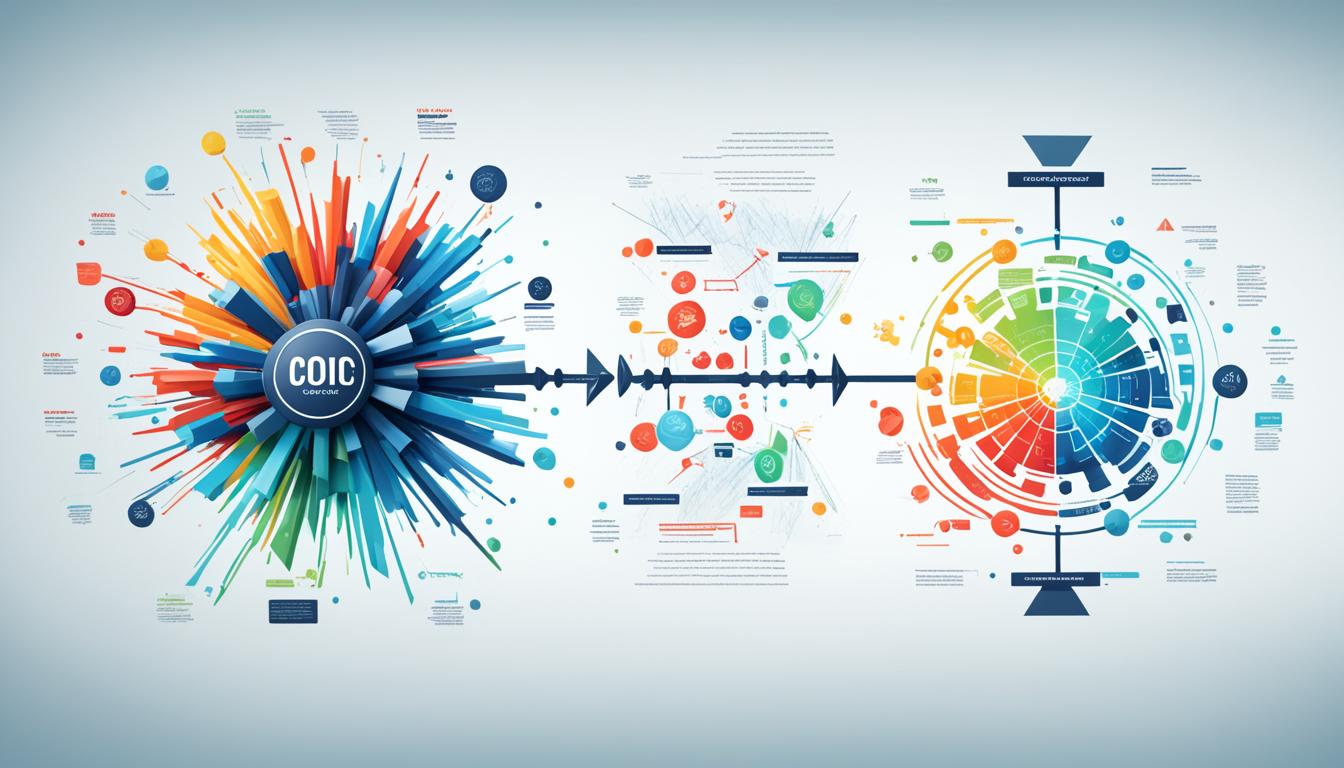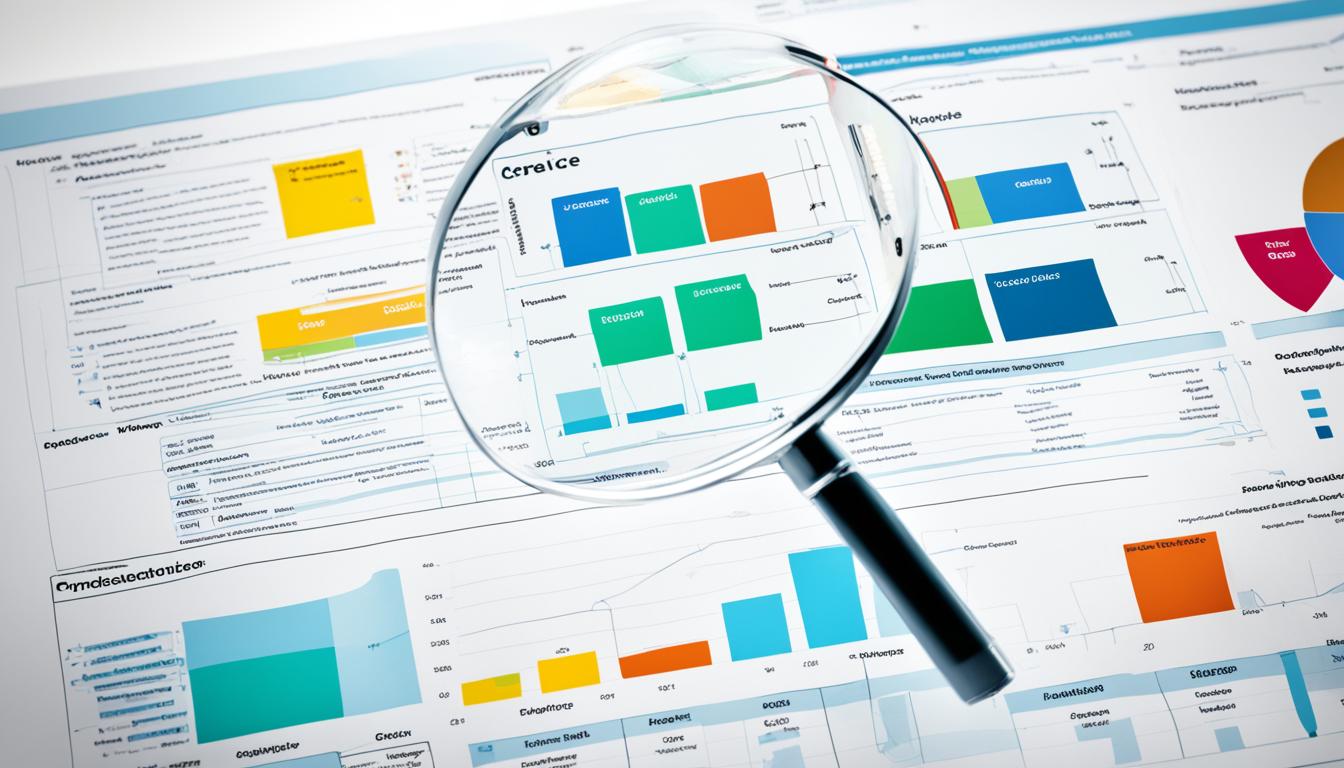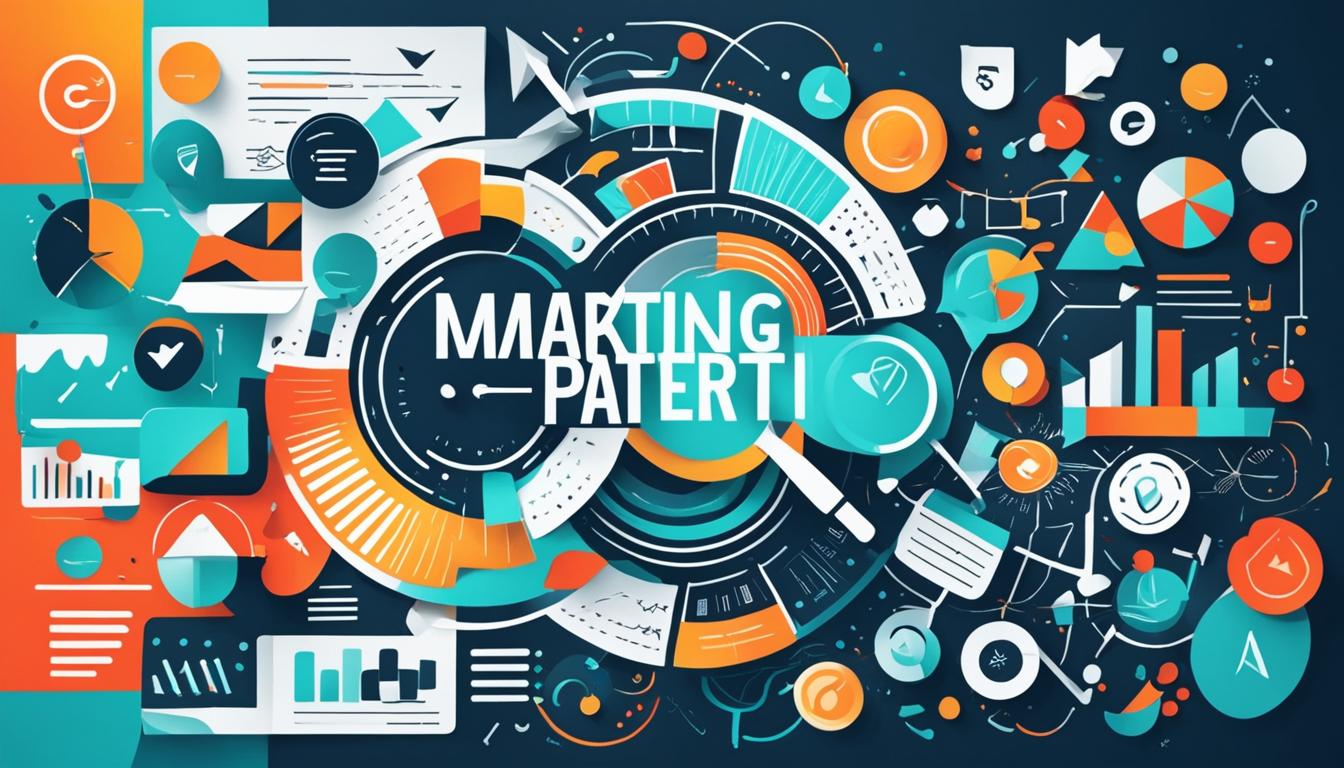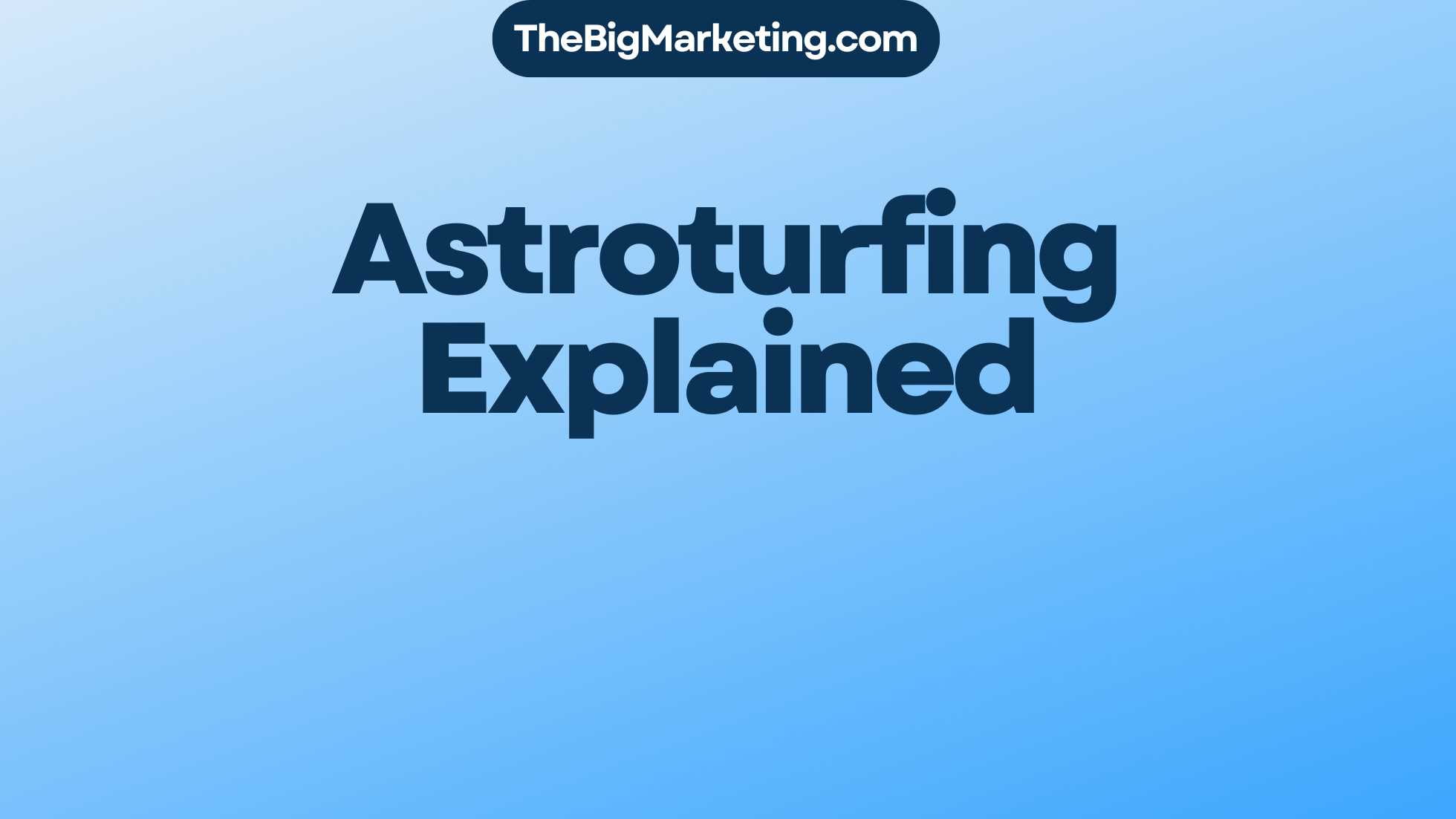Digital marketing and online marketing are often used interchangeably, but they have slight differences. Digital marketing is a broad term that encompasses various strategies, while online marketing is a subset of digital marketing that specifically focuses on marketing online. In this guide, we will explore the key differences and similarities between digital marketing and online marketing, as well as provide insights into choosing the best strategies and best practices for each.
Key Takeaways:
- Digital marketing is a broad term that covers various strategies, while online marketing is a subset of digital marketing focused on marketing online.
- Digital marketing encompasses a wide range of techniques and channels, including search engines, websites, social media, email, and mobile apps.
- Online marketing utilizes the internet as a primary channel for marketing activities.
- Both digital marketing and online marketing have their advantages and disadvantages, and the choice between them depends on specific business goals and target audience.
- Best practices include understanding your target audience, setting clear goals, utilizing various digital channels, and continuously measuring and optimizing your marketing efforts.
Understanding Digital Marketing
Digital marketing has become a fundamental aspect of modern businesses, leveraging digital channels to promote products and connect with potential customers online. It encompasses various strategies, such as search engine optimization (SEO), blog writing, and the utilization of different distribution channels. By utilizing consumer data, digital marketing enables businesses to target specific audiences and deliver relevant messaging effectively. Whether you operate a B2B or B2C company, digital marketing offers a range of benefits to enhance your online presence and drive business growth.
Key Components of Digital Marketing
Effective digital marketing strategies involve a combination of key components, which include:
- Search Engine Optimization (SEO): A practice that aims to enhance website visibility and rankings on search engine results pages. By optimizing website content and structure, businesses can attract organic traffic and increase online visibility.
- Blog Writing: Creating compelling and informative blog articles helps establish thought leadership, engage audiences, and improve search engine rankings. Content should be relevant, valuable, and tailored to meet the needs and interests of your target audience.
- Distribution Channels: Utilizing various digital channels, such as social media platforms, email marketing, mobile apps, and websites, allows businesses to reach and engage with their target audience on multiple platforms. These distribution channels maximize the visibility and reach of your marketing efforts.
- Budgets: Allocating resources to different digital marketing strategies and channels is essential. Budgeting ensures that campaigns are properly funded to achieve optimal results and meet marketing goals.
By harnessing the power of digital marketing, businesses can effectively build their online presence, engage with their target audience, and drive conversions. The next section will explore the benefits of digital marketing in more detail.
Benefits of Digital Marketing
Digital marketing offers several benefits for businesses, making it a crucial component of any successful marketing strategy. Let’s explore some of the key advantages:
1. Reach a Wider Customer Base
Digital marketing allows you to reach a wider audience with less effort. Unlike traditional marketing channels that have geographical limitations, online ads can reach anyone, regardless of their location. This global reach opens up new opportunities for businesses to expand their customer base and tap into new markets.
2. Cost Efficiency
Compared to traditional marketing channels such as TV and print media, digital marketing offers significant cost efficiency. With digital advertising platforms, businesses can set flexible budgets and target specific audiences, ensuring their marketing efforts are cost-effective and yield a higher return on investment.
3. Measurable Results
One of the key advantages of digital marketing is its ability to provide measurable results. Through various analytics tools, businesses can track the performance of their campaigns, measure conversions, monitor website traffic, and carry out detailed analysis to optimize marketing strategies. This data-driven approach allows businesses to make informed decisions and continuously improve their marketing efforts.
4. Personalization
Digital marketing enables easy personalization of marketing campaigns based on customer data. By leveraging customer insights and segmentation, businesses can deliver targeted and personalized messaging, increasing the chances of conversions. Personalization helps in building stronger relationships with customers and enhances brand loyalty.
5. Customer Engagement
Digital marketing provides multiple channels for direct customer engagement. Whether it’s through social media platforms, interactive email campaigns, or live chat support, businesses can actively engage with their customers, address their concerns, and provide personalized assistance. This level of engagement fosters customer trust and loyalty, leading to increased customer satisfaction and repeat business.
To visualize the benefits of digital marketing, here is a concise table summarizing its advantages:
| Advantages of Digital Marketing |
|---|
| Wider reach |
| Cost-efficiency |
| Measurable results |
| Personalization |
| Customer engagement |
As digital marketing continues to evolve, businesses that embrace its strategies and techniques stand to gain a competitive edge in today’s digital landscape.
Types of Digital Marketing
Digital marketing encompasses various types of strategies that businesses can utilize to promote their products and connect with their target audience online. Understanding the different types of digital marketing can help you create an effective marketing strategy that aligns with your business goals. Here are some key types of digital marketing:
1. Content Marketing
Content marketing involves creating and distributing valuable and relevant content to attract and engage readers. This can include blog posts, ebooks, infographics, videos, and more. By providing valuable information, businesses can establish themselves as industry experts and build trust with their audience.
2. SEO (Search Engine Optimization)
SEO involves optimizing website content to improve its visibility on search engine results pages (SERPs). This includes keyword research, on-page optimization, link building, and technical SEO. By improving your website’s search engine rankings, you can drive organic traffic and increase visibility.
3. Social Media Marketing
Social media marketing focuses on leveraging social media platforms to connect with and engage your target audience. This can involve creating and publishing content, running social media ads, and engaging with followers. Social media platforms like Facebook, Instagram, Twitter, and LinkedIn can help businesses build brand awareness and drive website traffic.
4. Email Marketing
Email marketing involves sending targeted and personalized emails to nurture leads, promote products or services, and engage with customers. With email marketing, businesses can build a direct line of communication with their audience and deliver relevant content, offers, and updates.
These are just a few examples of the many types of digital marketing strategies available. Incorporating a combination of these strategies into your overall digital marketing plan can help you reach your target audience, drive traffic, and achieve your business goals.
Understanding Internet Marketing
Internet marketing is a subset of digital marketing that specifically focuses on marketing activities that require the use of the internet. It includes strategies like search engine optimization (SEO), pay-per-click advertising, email marketing, and social media marketing. While digital marketing is a broader term, internet marketing is a more specific form of digital marketing that centers around online marketing efforts.
Digital Marketing vs. Internet Marketing: The Differences
When discussing marketing in the digital age, two terms often come up: digital marketing and internet marketing. While these terms are used interchangeably, they have distinct differences in their definitions and scope.
Digital marketing is a broad term that encompasses a wide range of marketing strategies that utilize various digital channels. These channels include online marketing, social media marketing, search engine optimization (SEO), email marketing, and more. Digital marketing strategies can be applied both online and offline, providing businesses with a holistic approach to reaching their target audience.
Internet marketing, on the other hand, specifically focuses on marketing activities that require the use of the internet. It primarily revolves around online marketing efforts such as SEO, pay-per-click (PPC) advertising, email marketing, and social media marketing. Internet marketing strategies are centered on leveraging the power of the internet to engage with potential customers and drive conversions.
While there are overlapping strategies between digital marketing and internet marketing, it is important to note that not all digital marketing strategies fall under the umbrella of internet marketing. The key distinction lies in the broader scope of digital marketing, which includes both online and offline channels, whereas internet marketing is solely focused on online marketing activities utilizing the internet.
To better understand the differences between digital marketing and internet marketing, let’s take a look at a comparison table:
| Digital Marketing | Internet Marketing |
|---|---|
| Encompasses a wide range of marketing strategies | Specifically focuses on marketing activities that require the use of the internet |
| Includes online and offline channels | Primarily centered on online marketing efforts |
| Utilizes various digital channels such as social media, email, and SEO | Revolves around online strategies like SEO, PPC, email marketing, and social media marketing |
| Offers a holistic approach to reaching the target audience | Uses the power of the internet to engage with potential customers |
As you can see from the comparison table, both digital marketing and internet marketing have their own unique characteristics. Understanding the differences will help businesses develop effective marketing strategies that align with their goals and target audience.
Now that we have explored the differences between digital marketing and internet marketing, let’s delve deeper into the overlapping strategies that can be used in both approaches.
Overlapping Strategies in Digital Marketing and Internet Marketing
Despite the differences between digital marketing and internet marketing, there are overlapping strategies that can be used in both. These strategies leverage the power of the internet and digital channels to reach and engage with the target audience. Let’s explore some of the key overlapping strategies:
1. Search Engine Optimization (SEO)
Search engine optimization (SEO) is a crucial strategy in both digital marketing and internet marketing. It involves optimizing website content, structure, and technical aspects to improve organic search rankings. By optimizing for relevant keywords and providing valuable content, businesses can increase their visibility in search engine results pages (SERPs) and attract more organic traffic. SEO is an essential component of any successful digital marketing or internet marketing strategy.
2. Pay-Per-Click Advertising (PPC)
Pay-per-click (PPC) advertising is another strategy that can be utilized in both digital marketing and internet marketing. PPC advertising allows businesses to display targeted ads on search engines and other platforms and pay only when users click on their ads. This form of advertising provides instant visibility and can be highly effective in driving website traffic and generating leads. Platforms like Google Ads and social media advertising networks offer robust PPC advertising options for both digital and internet marketing campaigns.
3. Content Marketing
Content marketing is a strategy that revolves around creating and distributing valuable, relevant, and engaging content to attract and retain a clearly defined target audience. Regardless of whether it is employed in digital marketing or internet marketing, content marketing plays a significant role in establishing brand authority, driving website traffic, and nurturing customer relationships. Well-crafted blog posts, informative articles, videos, and infographics are some examples of content marketing assets that can be used across both digital and internet marketing campaigns.
4. Social Media Marketing
Social media marketing is a powerful strategy that spans both digital marketing and internet marketing. It involves leveraging various social media platforms to connect with the target audience, build brand awareness, and foster engagement. Social media marketing allows businesses to cultivate a community of loyal followers, promote their products or services, and drive website traffic. By creating compelling content, running targeted ads, and engaging with followers, businesses can effectively utilize social media for both digital and internet marketing purposes.
These are just a few examples of the overlapping strategies in digital marketing and internet marketing. By incorporating these strategies into your marketing efforts, you can maximize your reach, engagement, and conversions, no matter whether you are focusing on the broader field of digital marketing or the specific realm of internet marketing.

Creating a Digital Marketing Strategy
To create an effective digital marketing strategy, it is essential to understand your target audience. Start by building detailed buyer personas that represent the characteristics and preferences of your potential customers. These personas will provide valuable insights into their goals, challenges, and interests, enabling you to tailor your marketing efforts to their specific needs.
Once you have a clear understanding of your target audience, set clear goals for your digital marketing strategy. Consider what you want to achieve, whether it’s increasing brand awareness, generating leads, or driving sales. Your goals will serve as a roadmap for your marketing efforts, guiding your decision-making and helping you prioritize your resources.
Identify the digital channels that are most relevant to your target audience and align with your goals. These channels could include search engines, social media platforms, email marketing, content marketing, and more. Select the channels that have the highest potential to reach and engage your target audience effectively.
| Digital Channels | Description |
|---|---|
| Search Engines | Improve your visibility and drive organic traffic through search engine optimization (SEO). |
| Social Media Platforms | Connect and engage with your audience through various social media channels, such as Facebook, Twitter, and Instagram. |
| Email Marketing | Nurture leads and build relationships through targeted email campaigns. |
| Content Marketing | Create valuable and informative content to attract and engage your target audience. |
Next, evaluate your existing digital assets such as your website, social media profiles, and content. Determine if they align with your goals and if any improvements or updates are needed. This evaluation will ensure that your digital assets support your marketing strategy effectively.
Plan campaigns for owned, earned, and paid media. Owned media includes the digital assets you have full control over, such as your website and blog. Earned media refers to publicity and exposure gained through word-of-mouth, reviews, or social media mentions. Paid media involves paid advertising on various digital channels.
Finally, bring all your digital marketing campaigns together to create a cohesive strategy. Consistency across channels and a unified brand message will strengthen your overall marketing efforts and create a seamless experience for your audience.
In conclusion, creating a digital marketing strategy requires a deep understanding of your target audience, clear goals, the right digital channels, and optimized assets. By following these steps, you can develop a strong digital marketing strategy that effectively reaches and engages your target audience, driving significant results for your business.
Tips for a Successful Digital Marketing Strategy
A successful digital marketing strategy requires ongoing measurement, optimization, and customer engagement. Here are some tips to help you maximize the effectiveness of your digital marketing efforts:
1. Measurement
Continuously track and analyze the performance of your marketing efforts using analytics dashboards. Monitor key metrics such as website traffic, conversion rates, and engagement to gauge the success of your campaigns. By understanding what works and what doesn’t, you can make data-driven decisions to optimize your strategy.
2. Optimization
Based on the data and insights gathered, make necessary adjustments to improve the results of your campaigns. Test different variations of your ads, landing pages, and email subject lines to optimize their performance. Optimize your website’s SEO to improve organic search rankings and increase visibility.
3. Customer Engagement
Engage with your customers through personalized experiences. Segment your audience based on their preferences and behaviors, and deliver targeted messaging that resonates with each segment. Leverage personalized email campaigns to nurture leads and build strong relationships. Tailor your social media content to align with your audience’s interests and preferences.
4. Content Creation
Create high-quality content that provides value to your audience. Develop a content strategy that aligns with your business goals and target audience. Publish blog posts, articles, videos, or infographics that educate, entertain, and inspire your audience. Position your brand as a trusted authority in your industry through thought leadership content.
By implementing these tips, you can enhance your digital marketing strategy and achieve better results. Remember to consistently measure, optimize, engage with customers, and create valuable content to stay ahead in the digital landscape.
| Measurement | Optimization | Customer Engagement | Content Creation |
|---|---|---|---|
| Track and analyze key metrics | Make data-driven adjustments | Segment audience and deliver targeted messaging | Create high-quality, valuable content |
| Monitor website traffic and conversions | Optimize ads, landing pages, and SEO | Engage through personalized email campaigns | Develop a content strategy aligned with goals |
| Evaluate campaign performance with analytics | Test variations to improve performance | Tailor social media content to audience interests | Position brand as a trusted authority |
Conclusion
In conclusion, digital marketing and online marketing are closely related but have slight differences. Digital marketing is a broader term that encompasses various strategies, including online marketing. Internet marketing, on the other hand, specifically focuses on marketing activities that require the use of the internet.
Both digital marketing and internet marketing offer numerous opportunities to connect with and engage with your target audience. By understanding the differences and similarities between these two forms of marketing, you can effectively enhance your marketing strategy and achieve your business objectives.
Key takeaways from this guide include the importance of building detailed buyer personas, setting clear goals and identifying the digital channels and assets that will help you achieve those goals. Continuous measurement, optimization, and customer engagement are also crucial for a successful digital marketing strategy. By utilizing the right mix of digital marketing techniques, you can reach your target audience more effectively and drive better results for your business.
FAQ
What is the difference between digital marketing and online marketing?
Digital marketing is a broader term that encompasses various strategies, including online marketing. Online marketing specifically focuses on marketing activities that are done online.
What are the benefits of digital marketing?
Digital marketing allows businesses to reach a wider customer base, is cost-efficient compared to traditional marketing channels, provides measurable results, enables personalization, and allows for direct customer engagement.
What are some types of digital marketing?
Some types of digital marketing include content marketing, search engine optimization (SEO), social media marketing, and email marketing.
What is internet marketing?
Internet marketing is a subset of digital marketing that specifically focuses on marketing activities that require the use of the internet.
What are the differences between digital marketing and internet marketing?
The main difference lies in their definitions and scope. Digital marketing refers to a wide range of marketing strategies that utilize digital channels, while internet marketing specifically focuses on marketing activities that require the use of the internet.
Are there any strategies that overlap between digital marketing and internet marketing?
Yes, there are overlapping strategies such as search engine optimization (SEO), pay-per-click advertising, content marketing, and social media marketing.
How can I create an effective digital marketing strategy?
To create an effective digital marketing strategy, start by building detailed buyer personas, set clear goals, identify the digital channels and assets that will help achieve those goals, evaluate your existing digital channels and assets, and plan campaigns for owned, earned, and paid media.
What are some tips for a successful digital marketing strategy?
Some tips for a successful digital marketing strategy include ongoing measurement and optimization, customer engagement, and creating high-quality content.
What are the key takeaways between digital marketing and online marketing?
Digital marketing and online marketing are closely related but have slight differences. Digital marketing is a broader term that covers various strategies, including online marketing. Both offer opportunities to connect and engage with your target audience.





